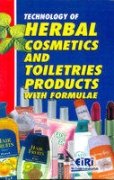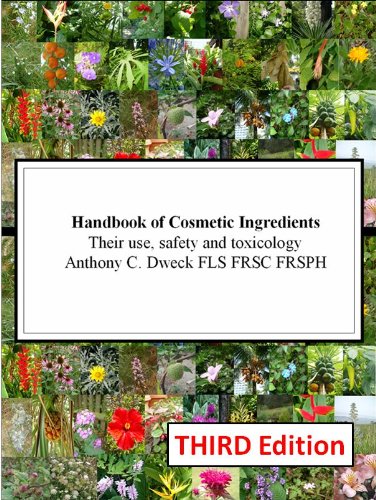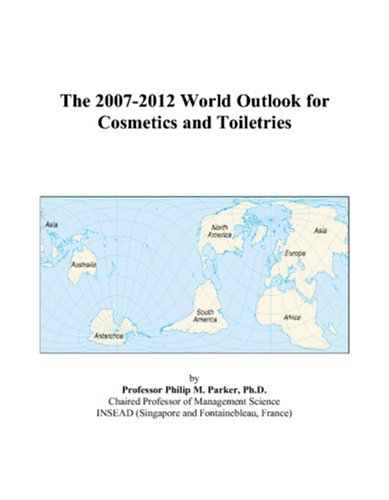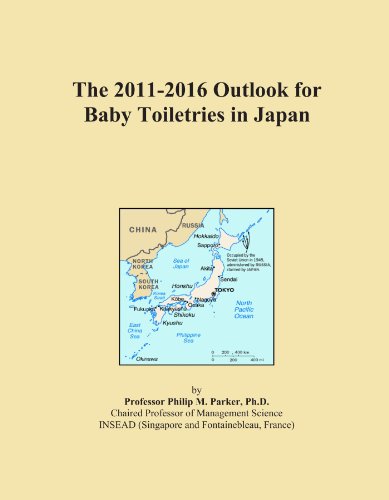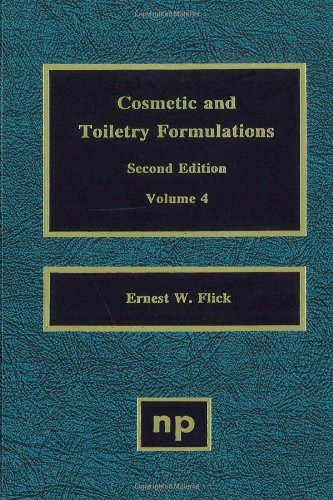Read more
skip to main |
skip to sidebar
This econometric study covers the latent demand outlook for baby toiletries across the regions of Greater China, including provinces, autonomous regions (Guangxi, Nei Mongol, Ningxia, Xinjiang, Xizang - Tibet), municipalities (Beijing, Chongqing, Shanghai, and Tianjin), special administrative regions (Hong Kong and Macau), and Taiwan (all hereafter referred to as "regions"). Latent demand (in millions of U.S. dollars), or potential industry earnings (P.I.E.) estimates are given across some 1,100 cities in Greater China. For each major city in question, the percent share the city is of the region and of Greater China is reported. Each major city is defined as an area of "economic population", as opposed to the demographic population within a legal geographic boundary. For many cities, the economic population is much larger that the population within the city limits; this is especially true for the cities of the Western regions. For the coastal regions, cities which are close to other major cities or which represent, by themselves, a high percent of the regional population, actual city-level population is closer to the economic population (e.g. in Beijing). Based on this "economic" definition of population, comparative benchmarks allow the reader to quickly gauge a city's marketing and distribution value vis-a-vis others. This exercise is quite useful for persons setting up distribution centers or sales force strategies. Using econometric models which project fundamental economic dynamics within each region and city of influence, latent demand estimates are created for baby toiletries. This report does not discuss the specific players in the market serving the latent demand, nor specific details at the product level. The study also does not consider short-term cyclicalities that might affect realized sales. The study, therefore, is strategic in nature, taking an aggregate and long-run view, irrespective of the players or products Read more...
Read more
A book that describes the function, safety and toxicology of the raw materials used in cosmetics and toiletries. Written for the safety assessor, toxicologist, formulator and consumer who wants to know the straight scientific truth about the ingredients in their products.
This book was written out of despair. The continual need to understand raw materials in much greater depth following the latest Regulation of the European Parliament and of the Council on cosmetic products (recast) 2008/0035 (COD) dated 10 November 2009 (finally as 1223/2009 on 30 November 2009) which replaces all other regulations and required the margin of safety to be calculated out caused many problems.
The NOAEL (No Observable Adverse Effects Level) figures are so rare as to be non-existent. There is a vast amount of historical animal testing data that exists in a thousand different documents, but finding it in one source that is readily accessible was not an easy project. It was with trepidation and a large dose of common sense that we assembled all the test results available be it animal data or modern alternatives and created a figure which we have called “The actual or estimated LD50 value:”
This figure is used in the calculation for the margin of safety (that should calculate out to be >100 for leave on products). In some cases the data we had did not match the experience we have accumulated over 40 years in the industry and so we have pitched our value at a higher level so that the theoretical value better matches consumer experience.
The second reason for writing the book was to offer those very consumers we strive to protect with our products an honest and truthful description of the raw materials that they are using. The volume has been written without emotion, so parabens are safe, Sodium Lauryl Sulfate in a rinse off product is innocuous, regardless of what a less informed marketer seeks to sell as a Unique Selling Proposition (USP).
To put the data firmly in the public domaine we have made this an eBook at a price never normally seen for a technical volume of this type. We hope those who buy it will approve.
This volume has now been updated with an additional 350 ingredients in the 3rd edition Read more...
Read more
This study covers the world outlook for cosmetics and toiletries across more than 200 countries. For each year reported, estimates are given for the latent demand, or potential industry earnings (P.I.E.), for the country in question (in millions of U.S. dollars), the percent share the country is of the region and of the globe. These comparative benchmarks allow the reader to quickly gauge a country vis-à-vis others. Using econometric models which project fundamental economic dynamics within each country and across countries, latent demand estimates are created. This report does not discuss the specific players in the market serving the latent demand, nor specific details at the product level. The study also does not consider short-term cyclicalities that might affect realized sales. The study, therefore, is strategic in nature, taking an aggregate and long-run view, irrespective of the players or products involved. Read more...
Read more
This econometric study covers the latent demand outlook for baby toiletries across the prefectures and cities of Japan. Latent demand (in millions of U.S. dollars), or potential industry earnings (P.I.E.) estimates are given across some 1,000 cities in Japan. For each city in question, the percent share the city is of it's prefecture and of Japan is reported. These comparative benchmarks allow the reader to quickly gauge a city vis-a-vis others. This statistical approach can prove very useful to distribution and/or sales force strategies. Using econometric models which project fundamental economic dynamics within each prefecture and city, latent demand estimates are created for baby toiletries. This report does not discuss the specific players in the market serving the latent demand, nor specific details at the product level. The study also does not consider short-term cyclicalities that might affect realized sales. The study, therefore, is strategic in nature, taking an aggregate and long-run view, irrespective of the players or products involved.
This study does not report actual sales data (which are simply unavailable, in a comparable or consistent manner in virtually all of the cities in Japan). This study gives, however, my estimates for the latent demand, or the P.I.E., for baby toiletries in Japan. It also shows how the P.I.E. is divided and concentrated across the cities and regional markets of Japan. For each prefecture, I also show my estimates of how the P.I.E. grows over time. In order to make these estimates, a multi-stage methodology was employed that is often taught in courses on strategic planning at graduate schools of business. Read more...
Read more
More than 950 cosmetics and toiletry formulations are detailed in this well-received and useful book. It is based on information obtained from industrial suppliers.
If you would like to purchase the entire 7-volume set, please call 607-33 Read more...
Read more
Toiletries
Best Seller Toiletries - Save 20-30 Precent on Quality Product And Free Return Guarantee , See More Detail Toiletries Shop Now Today.
Saturday, January 26, 2013
Wednesday, January 23, 2013
The 2011-2016 Outlook for Baby Toiletries in Greater China
The 2011-2016 Outlook for Baby Toiletries in Greater China Review
This econometric study covers the latent demand outlook for baby toiletries across the regions of Greater China, including provinces, autonomous regions (Guangxi, Nei Mongol, Ningxia, Xinjiang, Xizang - Tibet), municipalities (Beijing, Chongqing, Shanghai, and Tianjin), special administrative regions (Hong Kong and Macau), and Taiwan (all hereafter referred to as "regions"). Latent demand (in millions of U.S. dollars), or potential industry earnings (P.I.E.) estimates are given across some 1,100 cities in Greater China. For each major city in question, the percent share the city is of the region and of Greater China is reported. Each major city is defined as an area of "economic population", as opposed to the demographic population within a legal geographic boundary. For many cities, the economic population is much larger that the population within the city limits; this is especially true for the cities of the Western regions. For the coastal regions, cities which are close to other major cities or which represent, by themselves, a high percent of the regional population, actual city-level population is closer to the economic population (e.g. in Beijing). Based on this "economic" definition of population, comparative benchmarks allow the reader to quickly gauge a city's marketing and distribution value vis-a-vis others. This exercise is quite useful for persons setting up distribution centers or sales force strategies. Using econometric models which project fundamental economic dynamics within each region and city of influence, latent demand estimates are created for baby toiletries. This report does not discuss the specific players in the market serving the latent demand, nor specific details at the product level. The study also does not consider short-term cyclicalities that might affect realized sales. The study, therefore, is strategic in nature, taking an aggregate and long-run view, irrespective of the players or products Read more...
Free Shipping The 2011-2016 Outlook for Baby Toiletries in Greater China @ Amazon.com
Monday, January 21, 2013
Handbook of Cosmetic Ingredients - their use, safety and toxicology (Dweck Data handbooks)
Handbook of Cosmetic Ingredients - their use, safety and toxicology (Dweck Data handbooks) Review
A book that describes the function, safety and toxicology of the raw materials used in cosmetics and toiletries. Written for the safety assessor, toxicologist, formulator and consumer who wants to know the straight scientific truth about the ingredients in their products.
This book was written out of despair. The continual need to understand raw materials in much greater depth following the latest Regulation of the European Parliament and of the Council on cosmetic products (recast) 2008/0035 (COD) dated 10 November 2009 (finally as 1223/2009 on 30 November 2009) which replaces all other regulations and required the margin of safety to be calculated out caused many problems.
The NOAEL (No Observable Adverse Effects Level) figures are so rare as to be non-existent. There is a vast amount of historical animal testing data that exists in a thousand different documents, but finding it in one source that is readily accessible was not an easy project. It was with trepidation and a large dose of common sense that we assembled all the test results available be it animal data or modern alternatives and created a figure which we have called “The actual or estimated LD50 value:”
This figure is used in the calculation for the margin of safety (that should calculate out to be >100 for leave on products). In some cases the data we had did not match the experience we have accumulated over 40 years in the industry and so we have pitched our value at a higher level so that the theoretical value better matches consumer experience.
The second reason for writing the book was to offer those very consumers we strive to protect with our products an honest and truthful description of the raw materials that they are using. The volume has been written without emotion, so parabens are safe, Sodium Lauryl Sulfate in a rinse off product is innocuous, regardless of what a less informed marketer seeks to sell as a Unique Selling Proposition (USP).
To put the data firmly in the public domaine we have made this an eBook at a price never normally seen for a technical volume of this type. We hope those who buy it will approve.
This volume has now been updated with an additional 350 ingredients in the 3rd edition Read more...
Labels:
cosmetic,
Dweck,
Handbook,
handbooks,
Ingredients,
safety,
toxicology
Monday, January 7, 2013
The 2007-2012 World Outlook for Cosmetics and Toiletries
The 2007-2012 World Outlook for Cosmetics and Toiletries Review
This study covers the world outlook for cosmetics and toiletries across more than 200 countries. For each year reported, estimates are given for the latent demand, or potential industry earnings (P.I.E.), for the country in question (in millions of U.S. dollars), the percent share the country is of the region and of the globe. These comparative benchmarks allow the reader to quickly gauge a country vis-à-vis others. Using econometric models which project fundamental economic dynamics within each country and across countries, latent demand estimates are created. This report does not discuss the specific players in the market serving the latent demand, nor specific details at the product level. The study also does not consider short-term cyclicalities that might affect realized sales. The study, therefore, is strategic in nature, taking an aggregate and long-run view, irrespective of the players or products involved. Read more...
Free Shipping The 2007-2012 World Outlook for Cosmetics and Toiletries @ Amazon.com
Sunday, January 6, 2013
The 2011-2016 Outlook for Baby Toiletries in Japan
The 2011-2016 Outlook for Baby Toiletries in Japan Review
This econometric study covers the latent demand outlook for baby toiletries across the prefectures and cities of Japan. Latent demand (in millions of U.S. dollars), or potential industry earnings (P.I.E.) estimates are given across some 1,000 cities in Japan. For each city in question, the percent share the city is of it's prefecture and of Japan is reported. These comparative benchmarks allow the reader to quickly gauge a city vis-a-vis others. This statistical approach can prove very useful to distribution and/or sales force strategies. Using econometric models which project fundamental economic dynamics within each prefecture and city, latent demand estimates are created for baby toiletries. This report does not discuss the specific players in the market serving the latent demand, nor specific details at the product level. The study also does not consider short-term cyclicalities that might affect realized sales. The study, therefore, is strategic in nature, taking an aggregate and long-run view, irrespective of the players or products involved.
This study does not report actual sales data (which are simply unavailable, in a comparable or consistent manner in virtually all of the cities in Japan). This study gives, however, my estimates for the latent demand, or the P.I.E., for baby toiletries in Japan. It also shows how the P.I.E. is divided and concentrated across the cities and regional markets of Japan. For each prefecture, I also show my estimates of how the P.I.E. grows over time. In order to make these estimates, a multi-stage methodology was employed that is often taught in courses on strategic planning at graduate schools of business. Read more...
Free Shipping The 2011-2016 Outlook for Baby Toiletries in Japan @ Amazon.com
Thursday, January 3, 2013
Thursday, December 27, 2012
Cosmetic and Toiletry Formulations, Volume 4
Cosmetic and Toiletry Formulations, Volume 4 Review
More than 950 cosmetics and toiletry formulations are detailed in this well-received and useful book. It is based on information obtained from industrial suppliers.
If you would like to purchase the entire 7-volume set, please call 607-33 Read more...
Free Shipping Cosmetic and Toiletry Formulations, Volume 4 @ Amazon.com
Copyright © Toiletries
